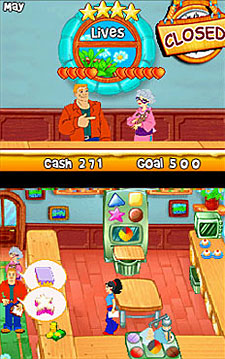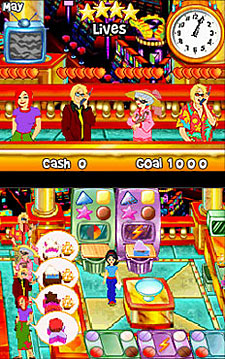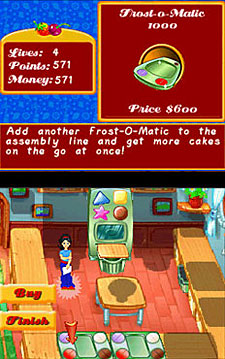One of my favorite 'guilty' television viewing pleasures is Food Network's Recipe for Success. Not so much the early episodes, which are overly cloying in their edutainment sincerity. I'm speaking of the second season, which shifts the focus of the show away from how you, the viewer, can start up your own business, and moves it squarely to watching the drama of upstart food-related business unfold, be it a local diner trying to open up, or an organic ice cream cookie product going through growing pains. Recipe for Success shines a spotlight on the sacrifices these entrepreneurs have to make, the long hours, the frayed relationships, the hordes of accumulated debt – the show exemplifies what people will put themselves through to fulfill their dreams and desires, and that translates into real & compelling viewing.
So it's no surprise that I was drawn to the DS-based iteration of Cake Mania, a port of the extremely popular PC-based casual game. Like similar service industry-based casual games, such as Gamelab's Diner Dash, you're the masthead of the food-based shop; a recent culinary school graduate trying to reopen her grandparent's flagging pastry shop. In order to buy their store back from the shadowy foodstuff monolith MegaMart, you set up your own pastry shop to earn their's back, one perfectly frosted cake at a time.
Ignoring the kneejerk bigbox reactionism, the story's not too different from your standard Recipe for Success episode. It immediately sets up the characters (typically those in a transitory spot in life, such as a recent college graduate or divorcee), their motivations behind opening up a new shop (family crisis), the challenges that lay before them (tough competition in a small town), and supporting characters (often family, although most often in Recipe for Success, family is involved as a financial backer instead of a helpless onlooker).
Of course, it wouldn't be interesting if there wasn't a struggle, and in Recipe for Success this drama always comes about by the aspiring entrepreneur attempts to maintain (or simply create) balance. Balancing budgets, balancing work with life, balancing the clientele's needs with what your store is capable of – a new restaurant or food-based business can fail for any of these reasons, and keeping each facet in check is a delicate matter of give-and-take. While it's difficult to capture and maintain that equilibrium, the resulting drama makes for a fascinating yarn.
So then, why, oh why, does Cake Mania, and other food service-based 'click management' games ignore all of these more substantial dramatic issues and instead tread the tired and elementary financial objective route?
Cake Mania drops you into a fully-realized, albeit small, pastry shop, complete with counter space, decor, and basic equipment to create cakes from a pre-made batter. You take hold of our entrepreneur, Jill, who had little problem getting her shop open and ready for business, and, instead of seeing her struggle to get the business' doors open, you start at Day One: Ready for business. Even though later levels feature minor economic management steps, such as buying individual pieces of kitchen equipment, you're initially thrust into the bakery not like an owner, but like a service-level employee with the kitchen prepped, tables wiped clean, and waiting for you to serve those who step up to the counter.
The gameplay is quite simple, not unlike prior food-service games like Tapper (recently reincarnated as an Xbox Live title), Betty's Beer Bar, Burger Rush, Diner Dash and a litany of other, oh-so-similar titles. You have a basic template of cakes, based on cake shape, frosting, possible multiple layers and decorations, and try to balance customer orders while making sure you don't screw up preparing any current orders. To realize this, you tap on the cake symbols, colors and devices in order to guide Jill through the process of baking and serving each cake. And while, each sole order isn't overly complex, juggling a number of them at once can become a bit frantic, which is where the challenge lays. Screw up a cake and you've lost money, not to mention the waning customer's patience.
However, since the game is focused mostly on fulfilling customer demands and 'tap-based management', Cake Mania ducks the major issues in owning and operating your shop, which is to say, it's not dealing with your customers that's the primary concern of an upstart business (while they can be trying, fulfilling their orders are the least of your worries), but that of balancing your desire to succeed with your quality of life.
While common 'knowledge' erroneously dictates that '9 out of 10 restaurants fail', the truth is actually much more conservative: restaurants and other food-service industries have roughly the same 60% failure rate as other business endeavors. However, the reasons why these restaurants, including pastry businesses, fail are much more complex than simply being economically invalid or having a poor product: Many of these storefronts are actually profitable, but fail because the proprietors want out. The owners are sick of the long hours (routinely 75+ a week), the sacrifices, the strain on family & loved ones, so they bail. They sell to another owner, change management, whatever it takes – they collect their winnings and go.
Contrast this with Cake Mania, in which Jill never tires. You can even buy her 'better' shoes, which allot her greater speed while working in the kitchen. She does not fatigue – only the customers experience that while waiting in line for their delicious pastries. Jill operates on high, alienated from any personal life or obligations, works all business hours of the day, every day, every week, every month, every year. All to blindly follow profit and get her parent's business running again.
Those are admirable traits, that's for sure, but they blissfully ignore any quality of life issues which are the primary balancing act of any food-service proprietor. So again I ask: Why ignore them in a game? It's not as if these issues are alien to their core audience. Such an act might actually build more sympathy for the main character, and empathy for her plight (as well as a richer loss-condition) if balancing her quality of life were the focal point of the game instead of juggling the customer's ever-unrealistic wants and needs. This isn't to say that profit & customer satisfaction is totally out of the question, as how many cakes she can bake and how quickly she can service customers still effects her bottom line, but it certainly does slightly re-prioritize matters.
I don't expect Pastry Tycoon from Cake Mania, and the rout tapping from oven-to-frosting-to-topping is addictive (although somewhat cumbersome on the cramped DS screen), but it's frustrating to see shops portrayed in this single-minded manner when the truth is so much more interesting, and not even much more difficult to implement. Most action/adventure games have used deteriorating physical health as a way to gauge how well the player is performing (and, in some cases, mental health in games like Eternal Darkness), so why not try the same in a casual game? And, truthfully, an owner goes into business because they know their output is good & solid – they're confident in their product and they can (more often than not) execute it in their sleep. It's the rest of the business that tires them out! So why not base the game's goals on that? After all, isn't the end result of failure the same, no matter what?
While 'quality of life' has always been a prickly subject concerning game producers and developers, I (as well as many other prior food-service proprietors) obviously feel it's a bit of a sticking point concerning the industry, so why not recognize it? Why not make that the main contingency point? Why persist in having the lead, often female, character of these casual games be little more than a slave to customer desires, as opposed to trying to fulfill their own wants and needs, since that's the major failing point of these business to begin with? As Recipe for Success demonstrates, it makes for much better viewing, much more fulfilling drama, and much meatier conflicts, which can only result in a better gaming experience for everyone involved.







#1 Soup Jul 30, 2007 08:13pm
well, it's Cake Mania, not Harvest Cake.
That series, while in very simplfied terms being about the same thing (time management in a chosen profession), has always had a more inclusive look at a simulated life. Cake Mania comes off as "just a game," to put it bluntly.